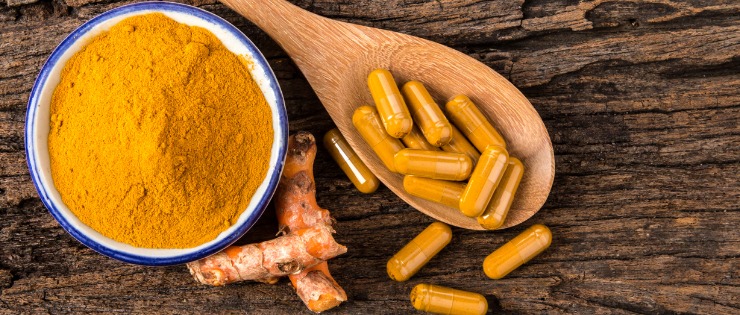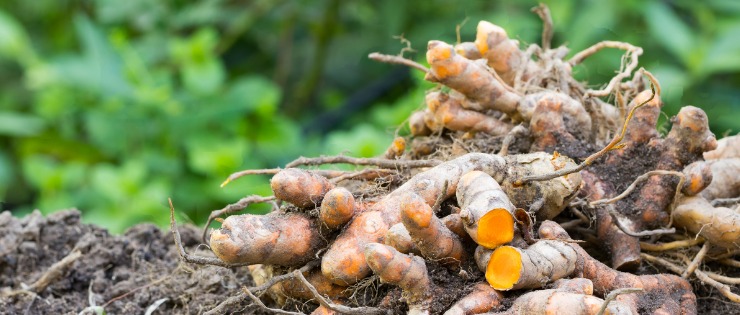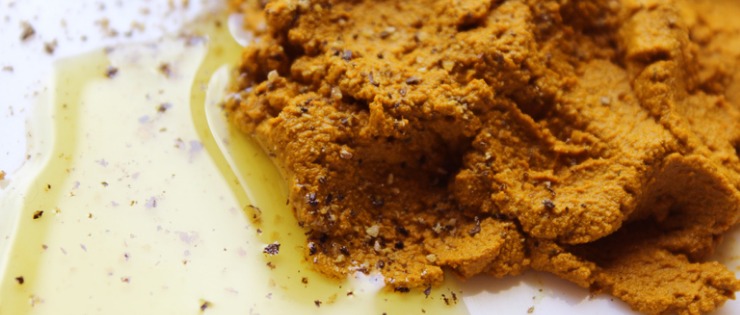
Turmeric is a bright yellow spice that adds colour and flavour to foods. But health experts credit turmeric and its active ingredient curcumin with far more benefits than a flavour enhancer.
The anti-inflammatory and antioxidant effects of turmeric mean it has been trialled or used to prevent and treat everything from minor skin conditions to heart disease and cancer.
Quite possibly turmeric is a miracle superfood. But turmeric supplements aren’t for everyone and too much can cause health problems.
What is Turmeric?
The turmeric plant grows in India and tropical regions of Southern Asia. Turmeric grows five to six feet tall and has bulb-like roots that grow rhizomes which new stems and plants grow from. A relative of the ginger family, turmeric has large green leaves and dull, yellow flowers. The root is most commonly used in Indian cooking for its bitter taste but it’s also used to colour some butter and cheeses.
Turmeric has a long history. It dates back as far as 4,000 years and has been used in ancient Chinese and Ayurvedic medicine.
Turmeric’s bioactive ingredient, curcumin, is a known anti-inflammatory and antioxidant that can improve minor health conditions through to reducing the risk of some cancers. The curcumin chemical makes up two to six percent of the turmeric plant by weight. Curcumin is in the root and is more potent than turmeric. Javanese ginger also contains curcumin.

What are the Potential Health Benefits of Turmeric?
For the past decade scientific researchers have conducted a multitude of studies to try confirm turmeric as a cure-all spice. Not all research on turmeric has been conclusive and results have contradicted themselves. Some scientists believe curcumin can trick drug screens into providing false positives. Since 2009, at least 15 articles have been retracted and many more corrected.
While researchers have conducted some clinical trials on humans, most of the research has been completed in the lab or on animals. The results achieved in a petri dish or on an animal rarely translate to the same effect in humans. Curcumin has been described as an unstable, reactive and non-bioavailable compound because it can’t be adequately absorbed in the human body.
Below are some of the ailments and disease curcumin is linked as a potential remedy.
Heart Conditions
A study revealed that turmeric and curcumin supplements can improve heart health by reducing LDL ‘bad’ cholesterol and lower triglycerides in healthy people and those at risk of heart disease.
Turmeric may also prevent atherosclerosis, the buildup of plaque that can block arteries which can cause heart attack or stroke. As it stops platelets from clumping together turmeric can prevent blood clots forming in arteries.
Early research suggests taking a curcumin supplement for five days following bypass surgery can reduce the risk of heart attack.
An animal research study showed curcumin could even reverse an enlarged heart, improve function and reduce scar tissue.
Arthritis Conditions
The anti-inflammatory properties of turmeric means it can relieve osteoarthritis pain. It can also reduce symptoms from other inflammatory conditions like bursitis and rheumatoid arthritis with curcumin.
A 2012 study revealed curcumin reduced the joint pain and swelling caused by rheumatoid arthritis more than a common non-steroidal anti-inflammatory drug. Another study showed turmeric was more effective at preventing than treating joint inflammation.
Diabetes
A study published in Diabetes Care tracked 240 people with prediabetes and found that by taking curcumin for nine months, none of them developed type 2 diabetes. However, 16% taking a placebo developed diabetes. The study demonstrated that curcumin improves the ability to use insulin which improves blood sugar levels and reduces inflammation.

Skin Problems
Not all turmeric is ingested. A topical curcumin gel is used to treat burns and scalds because it reduces pain and inflammation and aids the healing process with less scarring.
Eczema and psoriasis sufferers may take a supplement to reduce the severity. Other skincare products contain curcumin because it soothes blemishes and irritation. Turmeric also has antibacterial qualities.
Eye Problems
Research shows taking curcumin can improve the long-term inflammation known as anterior uveitis in the middle layer of the eye.
Taking curcumin for even a few weeks can relieve discomfort from dry eye, allergic conjunctivitis, glaucoma and maculopathy and ischemic.
Digestion Issues
Researchers have found turmeric can assist with multiple health problems relating to the digestive system.
Ulcerative Colitis
People with ulcerative colitis, a chronic disease of the digestive tract, can help stay in remission by taking turmeric supplements with their conventional medical treatment. A double-blind placebo study of people whose colitis was in remission found a significantly lower relapse rate amongst people who took the supplements compared to the placebo.
In Japan, prescription medicine for ulcerative colitis have curcumin added to improve the medication’s effectiveness.

Crohn’s Disease
Taking curcumin daily for one month can reduce symptoms of Crohn’s including diarrhea, stomach pain and bowel movements.
Irritable Bowel Syndrome
British research has found that a turmeric extract taken daily for eight weeks can reduce the symptoms of irritable bowel syndrome (IBS).
Indigestion
A German study found turmeric reduces the symptoms of bloating and gas in people who suffer from indigestion. The study led to the German Commission E approving turmeric for those people with digestion problems.
Liver Function
More than half of people who are obese suffer from non-alcoholic fatty liver disease. Oxidative stress is a key cause of liver damage but curcumin can protect the liver. A study of 87 people suffering from the disease were given a turmeric supplement for eight weeks. Liver health improved in 75% of those who took the supplement and 5% who took the placebo.
Improved Memory
A University of California, Los Angeles study in 2017 confirmed the theory that curcumin can improve memory. Seniors in India have much lower rates of Alzheimer’s than Americans and they have thought the high quantity of turmeric in their diet is responsible.
The double-blind placebo study involved 40 people aged between 50-90 with mild memory complaints taking 90 mg of curcumin twice daily or a placebo for 18 months. The results showed a 28% improvement in memory tests and brain PET scans showed significantly less amyloid and tau signals which are indicators of poor memory and Alzheimer’s.
While the effects of curcumin are not exactly known, the study’s first author Dr Gary Small believes it may be ‘due to the ability to reduce brain inflammation, which has been linked to both Alzheimer’s disease and major depression.’
Cancer
Laboratory studies on cancer cells have shown that curcumin has anti-cancer effects because it can kill cancer cells and prevent more from growing. Curcumin seems to be most effective against stomach cancer, bowel cancer and skin cancer cells. Doctors require more clinical trials on humans to know how well it works as treatment for cancer.
Colorectal Cancer
The very low incidence of bowel cancer in India is attributed to the natural antioxidants in turmeric and a plant-based diet. Not only can turmeric prevent colon cancer but it may be an effective component of treatment. Doctors gave a turmeric extract to 15 patients with advanced colorectal cancer. Their cancers hadn’t responded to chemotherapy or radiation yet the extract appeared to help stall the disease in a third of patients.
A 2013 laboratory study showed a combined treatment of chemotherapy and curcumin may be more effective than chemotherapy alone.
Lung Cancer
Smokers excrete significant amounts of mutagens in their urine which can be a biological marker of lung cancer. A study proved that taking a daily dose of turmeric for 30 days showed a reduced urinary extraction of mutagens in smokers. In the control group of non-smokers, there was no change in the level of mutagens.
Skin Cancer
Topical and oral curcumin can have a protective effect against the most common form of skin cancer, squamous carcinoma. It is thought curcumin inhibits skin growth and blocks tumor progress. Topical application means there are less problems with absorption in the body.
Absorption of Turmeric
Turmeric and curcumin is not well absorbed by the human body. Turmeric has low bioavailability because:
of the way it is distributed through the body
it is rapidly metabolised and excreted
it has low solubility in water.
The following methods improve the absorption of turmeric.
Mixing turmeric with a fat such as coconut oil, flaxseed oil or olive oil can improve its absorption rate. Without fats binding it, turmeric can’t get through the liver or stomach before being prematurely absorbed.

Eating turmeric with foods that contain quercetin such as apples, citrus, onions and red grapes helps inhibit an enzyme called sulfotransferase which causes turmeric to become inactive.
Bromelain, an enzyme found in pineapple juice and the stem, can be taken at the same time as turmeric supplements to increase absorption and the anti-inflammatory effects of curcumin.
Research has shown that consuming black pepper with turmeric will dramatically increase absorption of turmeric. Black pepper contains piperine which slows the rapid metabolism of curcumin in the liver and intestinal wall. Pepper is the most common method for improving the effectiveness of turmeric and is the reason so many recipes include turmeric and black pepper.
How to Consume Turmeric
If you want to increase your consumption of turmeric without taking a supplement, the options are limitless. Breakfast, lunch or dinner you can include turmeric in your diet.
Smoothie – a healthy start to the day, blend ½ teaspoon of turmeric with your almond or coconut milk and fruit to make a delicious smoothie.
Broth – add 1 teaspoon of turmeric powder or freshly grated turmeric and ½ teaspoon of black pepper to 4 cups of broth. Simmer and blend before serving.
Curry – rather than buying a pre-made curry powder or paste, make your own homemade curry powder so you know the quantity of turmeric and black pepper. Use the powder in a meat or vegetable curry.
Cold and Flu Preparation – if you have been inflicted with a winter cold or flu, relieve the symptoms by adding 3 tablespoons of turmeric to 1 cup of honey. Safe to store in the pantry long-term.
Latte or Tea – a hot turmeric drink made with 2 cups of milk of your choice with 1 teaspoon of turmeric, 1 teaspoon of raw honey, ½ teaspoon of cinnamon and a pinch of pepper. Blend and heat in a small saucepan.

Health Risks of Turmeric and Curcumin
Curcumin is one of those products where ‘too much of a good thing’ can be harmful. Herbs like turmeric can cause side effects and interact with other herbs, medications and supplements.
Eating turmeric in food is considered safe, it’s the turmeric and curcumin supplements that can cause problems. Speak to your doctor before starting.
Health experts have identified a range of potential problems from consuming too much curcumin or combining it with another supplement or medication.
Blood Thinning Medication
Turmeric is one of several herbs that can strengthen the effect of blood thinning medications. People taking warfarin, aspirin and other blood thinners are at risk of bleeding if they combine these drugs with turmeric.
Reducing Stomach Acid
If you take a drug designed to reduce stomach acid, a turmeric supplement may cause the drug to be ineffective and increases stomach acid.
Turmeric supplements can cause an upset stomach in some people.
Diabetes Medications
Turmeric supplements can lower blood sugar levels and cause hypoglycemia (low blood sugar) when taken with diabetic medications. The turmeric strengthens the drugs’ effects.
If you are a diabetic, speak to your doctor before taking any kind of turmeric supplement.
Who Shouldn’t Take Turmeric?
Taking turmeric supplements has few negative effects for most people. However, some people shouldn’t take them or should consult their doctor before starting.
Awaiting Surgery
People taking turmeric supplements should stop at least two weeks before surgery because of their blood thinning effect and advise their surgeon if they have taken them. Taking a supplement after surgery can help with inflammation and as a mild pain relief.
Fertility
Turmeric supplements can reduce testosterone levels and sperm movement which can reduce male fertility.
Pregnant and breastfeeding women can eat turmeric in foods but shouldn’t take turmeric supplements.
Iron Deficiency
People with an iron deficiency should be cautious about taking turmeric supplements as they can prevent the absorption of iron.
Stomach Problems
Turmeric can cause an upset stomach in some people and the symptoms of gastroesophageal reflux disease (GERD) can be made worse by taking turmeric supplements.
Anyone with gallstones or obstructions of the bile passages should talk to their doctor before taking turmeric supplements.

Hormone Sensitive Conditions
Curcumin acts like the hormone estrogen and can therefore make hormone-sensitive conditions worse. People suffering from breast cancer, uterine cancer, ovarian cancer, endometriosis or uterine fibroids should be cautious about taking turmeric and should consult their doctor.
Turmeric May Be A Superfood for You
Turmeric might seem to be a panacea for many health complaints, disorders and diseases. Some people are convinced turmeric has helped them. But there is a lack of concrete scientific data from human trials to back the claims. Like any complementary therapy, you should only take supplements after consulting with your doctor.